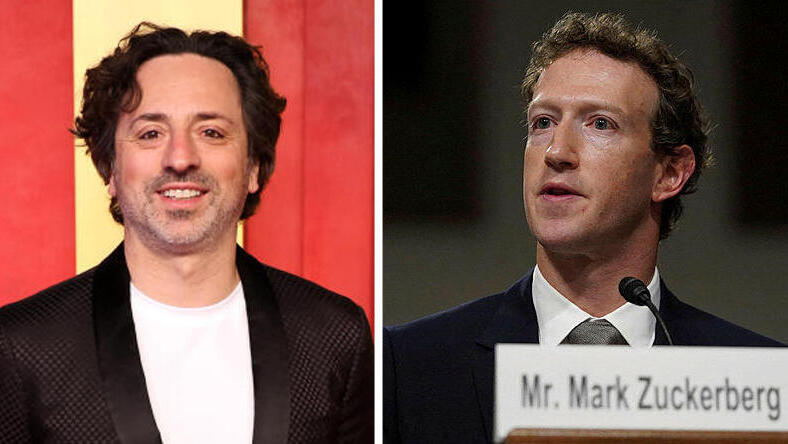
The AI talent gold rush: Tech giants offering million-dollar salaries, accelerated options
The technology giants are chasing after the hot talents in artificial intelligence with lucrative pay offers and an accelerated track for options. Google founder Sergey Brin even called one of the engineers to prevent him from moving to OpenAI
A while ago the phone of one of Google's top artificial intelligence engineers rang. On the other end of the line was company founder Sergey Brin, and he wasn't just calling to gossip. According to a report by The Information, Brin called to ask, maybe even beg, the employee not to leave for OpenAI. The employee did consider an offer from the competitor, but at the end of the persuasive conversation, and with the addition of various promises, including increased salary and compensation, he decided to stay at Google. At least for now.
Brin is no exception. According to The Information, Meta founder and CEO Mark Zuckerberg sends personal emails to employees at Google's DeepMind in an attempt to recruit them. Meta also offers candidates jobs without job interviews and, contrary to long-standing policy, offers higher wages in order to keep employees who received an offer from a competing company.
1 View gallery


Sergey Brin (left), Mark Zuckerberg
(Photo: Michael Tran / AFP, Reuters/Nathan Howard/File Photo)
The year and a half that have passed since OpenAI unveiled ChatGPT has reshaped the world of technology at a rapid pace, even in relation to the rapid changes in the field. Power relations changed, business and strategic focuses were reversed, and huge investments poured in. Large and small companies prepared and are preparing for the consequences and the pushback waves, and are working to recruit employees to expand and develop their activities. And these, it turns out, are in serious shortage at this time. The result: a huge battle between the technology giants and artificial intelligence companies for the recruitment of engineers and AI developers.
According to a report by the Wall Street Journal, in order to recruit employees, companies offer salary packages and benefits in the amount of one million dollars annually, an accelerated track for receiving options, and proposals to transfer entire engineering teams from another company in one fell swoop.
Zuhayeer Musa, co-founder of the recruitment platform Levels.fyi, told The Wall Street Journal that the median salary of six employees who received a job offer from OpenAI is $925,000 per year. The median salary of 344 machine learning and AI engineers, who shared their salary with the platform, is $400,000 a year, including bonuses and options.
This race for workers requires considerable financial resources. The technology giants and other large technology companies do not lack these. And leading startups also receive the capital injection they need in order to keep up. Anthropic, one of OpenAI's main rivals, last week raised $2.75 billion from Amazon—the company's largest venture capital investment—which added to the $1.25 billion already invested by Amazon and brought Anthropic's market value to $18.4 billion.
But not all actors manage to raise such a war chest. Scott Chetham, CEO of Faro Health, which leverages AI to help pharmaceutical companies design clinical trials for new drugs, said that he tries to offer employees 25% higher wages than the going rate, but throughout 2023 he had difficulty doing so in light of the great demand and the exorbitant salary offers they receive from the competing companies. According to him, in one case when he tried to recruit an employee from a leading consulting company, the company responded by doubling her salary. In order to prevent employees from fleeing, he had to significantly upgrade the package of options granted to them.
Not everyone is tempted to move
A high salary is not always a sufficient reason to move to another company. An AI researcher at Google told the Wall Street Journal that despite the many offers he receives, he has not been tempted to abandon Google until now, because only a few startups have the necessary capital to support the training of large language models (LLM, the technology behind services like ChatGPT). In another case, a Microsoft employee gave up a million dollar bonus and took an annual cut of $100,000 when he moved to an AI startup. This, against the background of enormous trust in the CEO and the expectation that within five to seven years his options in the startup will reach a value of $40 million.
Whether it is a high salary, the expectation of a significant reward in the future thanks to the exercise of options, or freedom of work and creation, the great demand for workers in the field of artificial intelligence causes the technology giants to make promises and offer conditions that they would not have offered in the past, even in an industry known for its pampering wages and conditions.
The situation will not always be like this: the great demand and high salaries are expected to bring new employees into the field like veterans who have undergone retraining or those who have chosen AI studies at the university with the aim of integrating into the field. At the same time, sometime, probably in a few years and not quarters, the hype will calm down, demand will stabilize and salaries will return to normal levels. But in the meantime, the race is at its peak, and those who can, are taking whatever they can get.
First published: 15:16, 31.03.24













